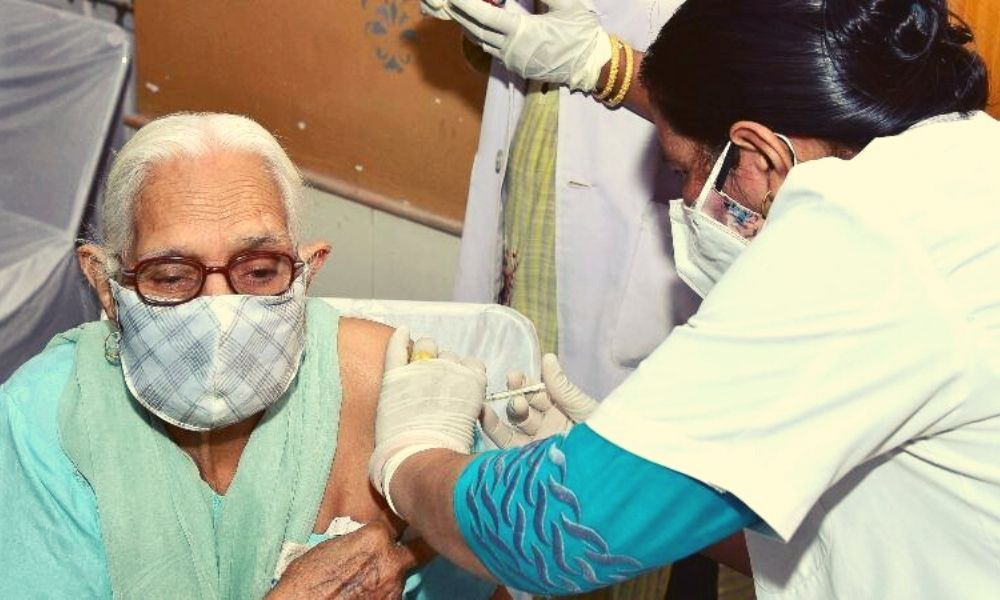
Image Credits: The New Indian Express
Decision To Increase Gap Between Two Covishield Doses Based On 'Real-Life Data': Govt
Writer: Kathakali Dutta
Kathakali Dutta is a second semester student of the Master of Communication and Journalism (Integrated) programme at the School of Mass Communication, KIIT Deemed University, Bhubaneswar.
India, 15 May 2021 5:54 AM GMT
Editor : Palak Agrawal |
Palak a journalism graduate believes in simplifying the complicated and writing about the extraordinary lives of ordinary people. She calls herself a " hodophile" or in layman words- a person who loves to travel.
Creatives : Palak Agrawal
Palak a journalism graduate believes in simplifying the complicated and writing about the extraordinary lives of ordinary people. She calls herself a " hodophile" or in layman words- a person who loves to travel.
The central government on Thursday, May 13, announced that the gap between the two doses of the Covishield vaccine has been increased from existing six to eight weeks to 12 to 16 weeks. This is the second time in three months that the gap between Covishield doses has been increased.
The central government on Thursday, May 13, announced that the gap between the two doses of the Covishield vaccine has been increased from existing six to eight weeks to 12 to 16 weeks. Whereas there was no recommendation for changing the interval between Covaxin doses and the time between two doses of Covaxin still remains the same, which is 28-42 days.
The government, in a statement, said that the decision to extend the gap between two doses of Covishield has been taken based on 'available real-life experience', especially from the United Kingdom.
This is the second time in three months that the gap between Covishield doses has been increased.
"This is beneficial both from the efficacy and the immunogenicity standpoint. This is a very good move because this is based on data that the government received on the basis of which they made a good scientific decision to increase the gap," Adar Poonawalla, the CEO of the Serum Institute of India (SSI) that makes Covishield, told NDTV.
In an interview with India Today, Chairman of India's Technical Advisory Group on COVID-19 vaccination, Dr NK Arora, responded to several claims stating the act of increasing the gap was to cover the vaccine shortage.
"Today, single dose recipients are about 14 crore; two doses recipients are four crores and out of single dose recipients, 10 per cent or about 2 crores are Covaxin, remaining 12 crores is Covishield. If I increase the interval [by one month], it is a matter of about five or six crore doses only," he said.
"We have a huge population and if lot of breakthrough infections occur, it does not auger well for the confidence of the people. In the last week of April, this evidence came from UK public health agency and then, Scotland as well Bristol's data came which shows that single-dose vaccine is 65-80 per cent effective," he added.
Stating his opinion, White House Chief Medical Advisor Dr Anthony Fauci said that this could be a 'reasonable approach' and under the given situation, India should try to vaccinate as many people as possible and ruled out the claims that the decision was to cover up for vaccine shortage.
"The fact that you delay it that long, it is very unlikely that it would have a negative effect on the efficacy of the vaccine. I would not refer to it as a cover-up when you don't have enough vaccines," he said.
Financial Times reported that India's decision to increase the gap corresponds with the recommendations of the UK and WHO. The UK and the World Health Organisation recommend gaps of 4-12 weeks and 8-12 weeks, respectively, between the two doses.
Can it be beneficial?
The United Kingdom had faced the second hit of the virus from December 2020 to January 2021. In view of the crisis prevailing over the UK then, it was decided that the gap between the first dose and the second dose of Astra-Zeneca (Covishield) would be extended to up to 12 weeks. Several reports have stated that this proved to be immensely effective in checking the COVID crisis in the country.
The rationale behind the delaying of the second dose is inoculating more people with the first dose of Covishield which will reduce the death risk. Studies have revealed that the first dose of Covishield reduces the chances of death by 80% and thereby, vaccinating a larger population with the first dose will automatically reduce the death rate of the country.
Also Read: Gasping For Breath: Oxygen Crisis At Goa Hospital Leaves 46 Dead in 48 Hrs
 All section
All section













